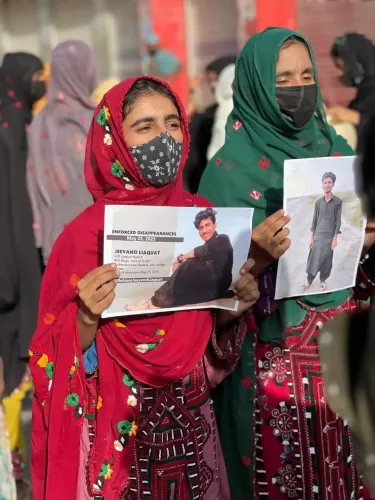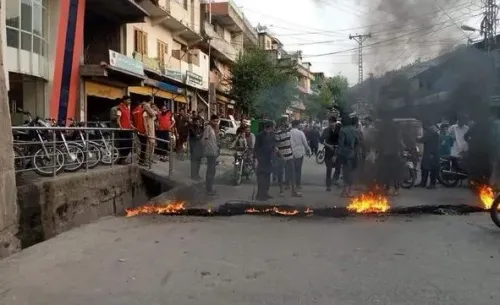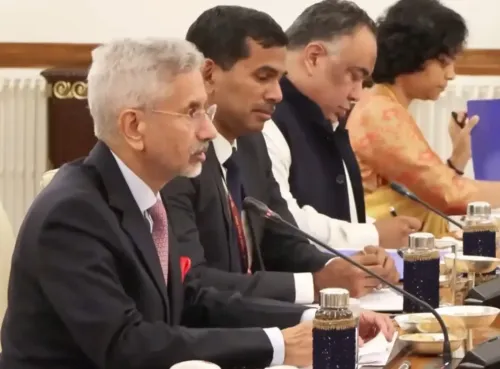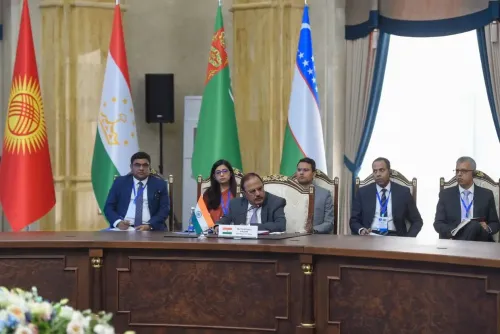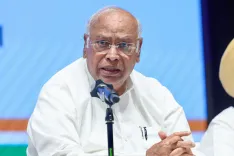Is the Power Transition in Bangladesh Leaving Electoral Legitimacy in Question?
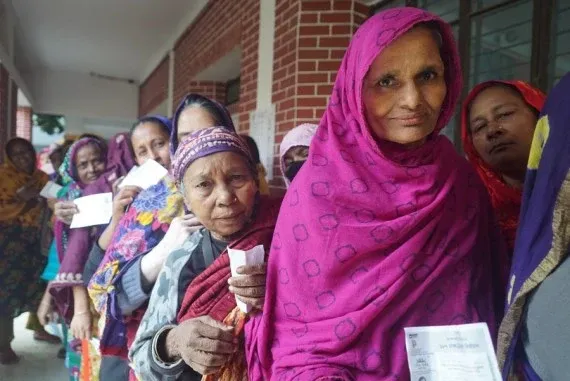
Synopsis
Key Takeaways
- Sheikh Hasina's departure has led to an interim government under Yunus.
- The rivalry between Awami League and BNP complicates the political landscape.
- Concerns about electoral legitimacy loom large as elections approach.
- Yunus faces skepticism from both major political parties.
- The potential for violence during electoral campaigns is significant.
Muscat, Aug 31 (NationPress) The departure of Bangladesh's former Prime Minister Sheikh Hasina has led to the establishment of an interim government under Nobel laureate Muhammad Yunus. This sudden shift in leadership, amidst the fierce rivalry between the Awami League and the Bangladesh Nationalist Party (BNP), has not only disrupted longstanding political traditions but has also raised serious concerns regarding electoral legitimacy, according to a report.
Hasina's tenure created a peculiar form of political stability in Bangladesh. However, her dominance left little doubt about the locus of power. Following her exit due to extensive student-led protests in 2024, the void left behind has not been filled by any institution or leader.
As reported by the Times of Oman, "For a nation used to the intense rivalry between the Awami League (AL) and the BNP, this abrupt change has not only disrupted entrenched political patterns but also left the question of electoral legitimacy hanging in a precarious environment. The possibility of conducting a free and fair election in this tumultuous atmosphere seems increasingly improbable, burdened by years of distrust, institutional decay, and the heavy toll of political violence that has marred the nation's democratic aspirations."
Yunus, being an outsider in the realm of Bangladesh politics, faces skepticism from both major political parties. The Awami League perceives Yunus as a betrayer who took power following Hasina's exit under international pressure. In contrast, the BNP views him not as a savior but as a technocrat devoid of political backing. They see him as a temporary figure whose role merely postpones their goal of reclaiming power.
The Times of Oman further states, "In such a climate, it remains uncertain whether Yunus has the authority, political connections, or grassroots legitimacy to facilitate a credible electoral process. Bangladesh’s institutional weaknesses exacerbate the crisis. The Election Commission, already distrusted due to its oversight of highly disputed elections, remains deeply compromised. Civil services and law enforcement, long accused of loyalty to Hasina’s regime, now find themselves caught between maintaining fragile neutrality and the temptation to uphold old allegiances."
"In this context, even the notion of a neutral caretaker government—a model that traditionally offered some level of trust during transitions—feels insubstantial. Yunus’ interim government lacks the robust political machinery necessary to take control of the electoral process from those loyal to partisan interests. This shortcoming makes the prospect of organizing a genuinely free election appear less like a chance for democratic renewal and more like an invitation for deeper conflict," the report emphasizes.
Supporters of the BNP are eager to reclaim their influence, while those aligned with the Awami League, fearing retribution, are reluctant to surrender without a struggle. The report warns: "The risk is that under Yunus’s leadership, without the backing of a strong political organization, the interim government may be unable to manage this escalating competition. Electoral campaigns may devolve into violent confrontations, where each faction tries to assert dominance through force rather than democratic means."
Given Bangladesh's history of street protests and non-parliamentary activism, with elections scheduled under Yunus' interim administration, the streets are likely to again become central to political discourse. Reports of clashes among student factions, labor unions, and local groups from both the Awami League and BNP have surfaced.
According to the Times of Oman: "If the BNP believes Yunus is unintentionally favoring AL influence in the electoral framework, it may resort to boycotts or violent protests, as seen in the past. Conversely, if the AL fears being dismantled through a fair election, it may deploy its extensive grassroots network to intimidate voters, disrupt polling, and undermine the legitimacy of the process. The outcome could be an election tainted not only by irregularities but also by widespread violence, with the interim government relegated to a passive observer."
In summary, Bangladesh’s future under Muhammad Yunus’s interim leadership is characterized by contradictions. While this moment theoretically offers a chance to reset the country’s democratic path after years of 'authoritarian drift' under Hasina, the practical reality appears much grimmer. The combination of institutional fragility, partisan division, street-level violence, and external interference complicates the challenge of conducting a fair election.

